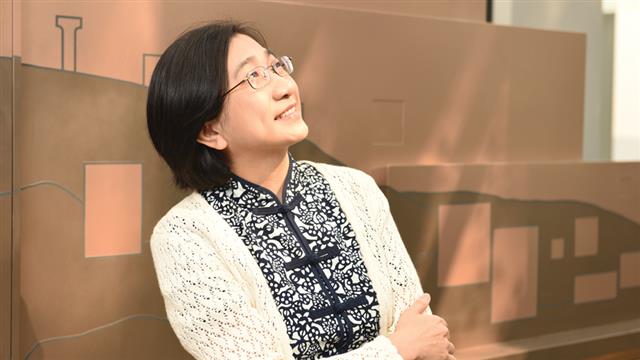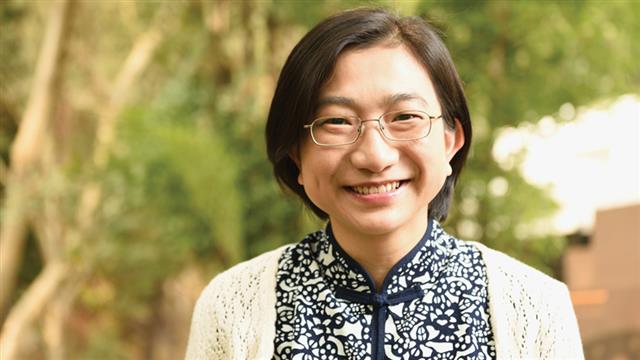Why was the Golden Jubilee Garden of Appreciation built?
When CUHK celebrated its golden jubilee in 2013, the University wanted to take that opportunity to acknowledge the contributions from its donors. So the Garden of Appreciation with the names of its major benefactors was built, so that our students, teachers, alumni and friends can appreciate their magnanimity and support to CUHK.
The directorship of the Clinical Sciences Administration of the Faculty of Medicine is very different from that of the Office of Institutional Advancement (OIA) in terms of job duties. What made you take on this challenge?
I joined the Faculty of Medicine as Director of Clinical Sciences Administration in 2001. I was responsible for general administration and public relations, and I also handled donations. In 2003, I went through the SARS outbreak with the medical workers at the Prince of Wales Hospital. I witnessed many touching stories and extremely generous donations. When I saw that there was a vacancy for the Director of Institutional Advancement, I was not sure if I was competent enough for the job. But I applied for it anyway, in the hope that it would allow me to try something new in my career.
Were there psychological barriers to overcome?
Many people told me that seeking donations is a gruelling experience. You might be rejected repeatedly. Donors are usually wealthy. How can they possibly know who Janet Chow is? I was worried. But I recalled that when I first joined the Faculty of Medicine, I didn't know a single doctor. I told myself, you would get to know the donors one by one, the way you got to know the doctors.
What is the relationship between donations and institutional advancement?
Institutional advancement and donations go together. When we have big projects in the pipeline, we'll receive big donations. For example, the University received a number of large donations to help it set up new Colleges to handle the transition to the four-year curriculum in 2012. CUHK plans to establish a private teaching hospital at a site near the MTR University Station. The Hong Kong Jockey Club has taken the lead in supporting this project by giving us a donation of HK$1.3 billion last year. We believe that more benefactors will follow.
What's your view on the University Grants Committee's Matching Grants Scheme?
The Government introduced this scheme in 2003 to promote a fundraising culture in universities. When a new round of the scheme is launched, more donations will come in and we all gear up for fundraising. We believe that we should seize this opportunity to secure 50% or 100% of the amount of the donations received from the matching funds as additional resources. CUHK has been fortunate in that it has had very good results from the first to the latest sixth rounds of the scheme.
Are all benefactors to CUHK famous and rich people?
When I first assumed the directorship of the OIA, I thought like some other alumni: Me a philanthropist? I don't think I'm up to it! Those who make donations to their alma maters must have great career achievements or wealth. But that's not necessarily true. As long as you identify with the University's mission, you can do your bit to support it. We now have 160,000 alumni. If each one donates HK$100, it will be a considerable sum. We don't ask them to make large donations. But if you enjoyed your life at CUHK, you can make a donation to your alma mater upon graduation as a token of gratitude. No matter how small, it's a great encouragement that means a lot to the University.
What is the most important factor in motivating people to donate?
The bond. If there is an emotional bond between you and a project for which you are asked to donate, you will be happy to support it. Benefactors to CUHK range from the social elite to ordinary citizens, alumni, teachers, and students. They made their donations to CUHK because they felt a bond of affection for the University. Some departments asked me about the secret to successful fundraising. The question I would ask first is not how much money we need. It's what the money will be used for. Will it be used to fund research, teaching, or community services? If the goal is clear and the reasons are sound, you'll eventually get the money.
Are there any stories that move you?
Like any other job, this one has brought me both joy and frustration. I was once invited by a department to a lunch to meet a scholarship donor. When I got home I flipped through some old documents and found that it was the scholarship I had received in my undergraduate years at CUHK. I was excited. I had never expected that I would meet my scholar-ship donor. On the day we met, I felt like the young girl meeting Daddy-Long-Legs. I prepared a bouquet. I thought that it had been over 20 years. Has the donor become an old lady now? But it turned out that she was a middle-aged lady. I told her I was the student she had helped. We were both happy meeting each other. Now the OIA tries to arrange meetings between donors and beneficiaries, so that the donors can share their life experiences with the students. This is valuable.
What have you learned from this job?
I have handled many donation cases during the past four years or so. I believe that destiny is at work in each case: when the university needs funding for a project, there is always someone willing to support it financially. It feels like destiny that the right support would come. Many donations are used to support student development programmes. Students should be grateful for this and shouldn't take it for granted. You may have a scholarship, or funding for writing a research report, joining extracurricular activities or overseas exchange. The amount may not be a large one, but it represents the general public's expectation for and confidence in you. It also involves a lot of efforts from university staff. We hope that you'll give back to society when you graduate.
Despite your busy work, you're an active member of the parent-teacher association of your daughters' schools. What's your key to effective time management?
I've been an active PTA member since my daughters entered kindergarten, and all the way to their primary and secondary school years. My two jobs at CUHK shared the same characteristic of irregular working hours. Sometimes I have to go to meetings in the evening and attend functions at the weekends. When I'm away from home for work, my husband takes care of the family. My two daughters are well-behaved and self-disciplined in their studies. This allows me to focus on my work. I'm grateful to my family.
What do you do in your leisure time?
I like crafting. Whenever I fret about something, I take out my kit to crochet dolls or to make paper flowers. I find real enjoyment making handcrafts. When I focus on them, my troubles disappear. By the time I finish, I'm cool-headed enough to figure out the solutions to my job-related problems.




